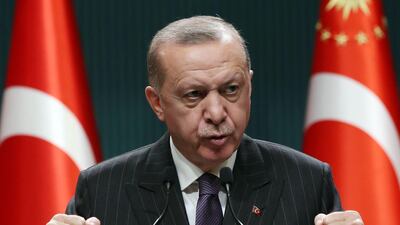US sanctions on Turkey over its purchase of Russian missiles led to near unified messages of regret, defiance and condemnation from both government and opposition figures in Ankara on Tuesday.
The previous evening, Washington carried out a long-standing threat to impose penalties for Turkey's acquisition of the S-400 air defence system.
Turkish Defence Minister Hulusi Akar was the most senior government member to criticise the decision by US President Donald Trump after Congress had passed a bill demanding sanctions.
“This sanctions decision has shaken all the values in our countries’ alliance,” he told the state-run Anadolu news agency. “Obviously, sanctions on a Nato member country will not only undermine the spirit of alliance but will deeply undermine trust among allies.”
Turkish President Recep Tayyip Erdogan’s spokesman, Ibrahim Kalin, said the sanctions would not alter Turkey’s determination to develop its indigenous defence capacity.
“Despite the narrow and hostile agenda of some circles in the US against Turkey, we believe that this issue can be resolved through political negotiations and technical expertise,” he said.
Turkey, a Nato member since 1952, bought the S-400s after claiming its efforts to buy American Patriot missiles were turned down. The Russian system arrived in July last year, prompting calls for sanctions to be imposed under the Countering America’s Adversaries Through Sanctions Act, known as Caatsa.
Although Mr Trump held off on punitive measures, even after the missiles were tested in October, Turkey was expelled from the programme to build the F-35 stealth fighter, a next-generation aircraft it had supplied with parts.
Its order for more than 100 jets was also cancelled amid claims that the S-400’s radar could be used by Russia to counter the plane’s top-secret technology.
The US president, who leaves office next month, finally authorised sanctions that target Turkey’s Defence Industries’ Directorate (SSB), its chairman Ismail Demir and three other executives.
The sanctions were widely perceived as the lightest of options of the dozen available to Mr Trump.
The move elicited a rare joint statement from four political parties – Mr Erdogan’s Justice and Development Party (AKP), its coalition ally the Nationalist Action Party (MHP) as well as the opposition Republican People’s Party (CHP) and Iyi Party.
“This misstep by the United States is incompatible with the spirit of allegiance,” Acting Parliamentary Speaker Celal Adan said as he read the statement.
“It is clear that it will not benefit our relations, which should be taken forward on the basis of mutual respect. Turkey is a country that does its part to contribute to peace and stability in its foreign policy.”
He added: “This attitude is contrary to Nato’s spirit of alliance. For these reasons, we invite the United States to turn back from this grave mistake as soon as possible.”
Meanwhile, the spokesman of the parliamentary foreign affairs committee, CHP MP Unal Cevikoz, denounced the sanctions as an attack on a “sovereign decision” taken by Turkey to strengthen Nato’s defences.
He called for the $2.5 billion system to be activated “as soon as possible,” adding: “Instead of taking this sanctions decision, it would be expected [of the US] to seek dialogue to resolve the issue.”
Iyi Party leader Meral Aksener tweeted that sanctions betrayed Nato and Turkey’s relationship with the US. “Topping the callousness towards Turkey’s problems with conceit by resorting to sanctions is neither worthy of an alliance nor contributes to the friendship between Turkey and the United States,” she said.
The main figure targeted by the sanctions, Mr Demir, said the Turkish defence industry would continue to grow despite the measures.
“The development of the domestic industry will continue, perhaps even faster,” he told a news conference in parliament. “In a sense, these [sanctions] will be a flare and a warning. We do not expect this to affect our relationships too much.”
The sanctions will block projects or the sharing of technology between US and Turkish defence companies as well as restrict financial aid of more than $10 million to the SSB. They also impose visa restrictions and asset freezes on Mr Demir and his three colleagues.
Following the sanctions announcement, the Turkish lira gained one per cent against the dollar on Tuesday, a sign that the relatively narrow measures were not as bad as expected.
“The good news for the market is that they are out of the way and it clears some of the page for [US President-elect Joe] Biden to rewrite the script of US-Turkey relations when he takes office,” said Timothy Ash, an emerging markets analyst at London’s Blue Bay Asset Management.

